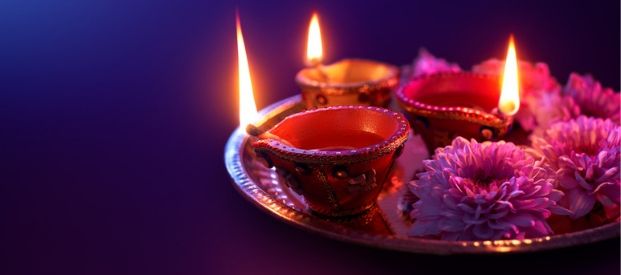Diwali – A Celebration of Light Over Darkness
Diwali is a joyous celebration of the victory of good over evil, light over darkness and knowledge over ignorance. It is India’s most important religious festival of the year, celebrated by Hindus, Sikhs and Jains and by Indian communities across the world.
Diwali is also known as the Festival of Light and in the days before it begins, people clean their houses and adorn them with lamps and fairy lights. Floors and courtyards are decorated with rangoli – intricate designs made from coloured rice, sand, powder and flower petals.
Diwali is a time for spirituality; a time to pray for prosperity and well-being for the year ahead. It is also a time to get together with friends and family; to share a meal, dance, watch fireworks and exchange gifts such as mithai, India’s traditional Diwali sweets.
When is it?
Diwali takes place over five days between October and November each year, the exact dates being determined by the position of the moon. In 2019 it will be celebrated on 27th October. The third day of the festival – the main Diwali night – occurs on the darkest night of the lunar month, which is when there is a new moon. This ‘New Moon Day’ is known as Kartik Amavasya.
What does it mean?
Because Diwali is at the centre of several different religions and takes place across so many regions, it has a number of meanings, each one being significant to a particular faith or a part of India.
For many people, Diwali honours the Hindu goddess of wealth, Lakshmi. The word Diwali means ‘row of lights’ and the lights which festoon so many houses during the festival are said to help Lakshmi find her way into the houses, bringing prosperity in the year to come.
For others Diwali is all about the return of the gods Rama and Sita to their kingdom of Ayodhya after Rama defeated the demon Ravana. To aid their homecoming, according to legend, people lit the path with rows of clay lamps.
Some see Diwali as the day on which Lord Krishna defeated the demon Narakasura; others consider it the day of the goddess Kali who represents the destruction of evil. For Sikhs, Diwali is linked with the release from prison in 1619 of Guru Hargobind who then led 52 Hindu kings to freedom; while for Jains it is a time to remember Mahavira and his final liberation from the cycle of rebirth.
Leicester’s Diwali
In the UK, Leicester’s Diwali Festival is a mark of the city’s pride in its diversity. From small beginnings in 1883, this event has become a fun-filled fortnight with lights decorating the entire length of the Belgrave Road and firework displays overhead, as well as traditional music, Bollywood dance, a rangoli exhibition, craft activities and Indian food specialities. Along Leicester’s waterway, beside illuminated canal boats, there are floating artworks and an amazing installation created by artist Patrick Murphy with a neon laser beam firing along the canal and up into the night sky.
For bright lights, colour and mouth-wateringly exotic aromas, there’s nothing quite like it. Leicester’s festival is one of the biggest Diwali celebrations outside India. Happy Diwali!










